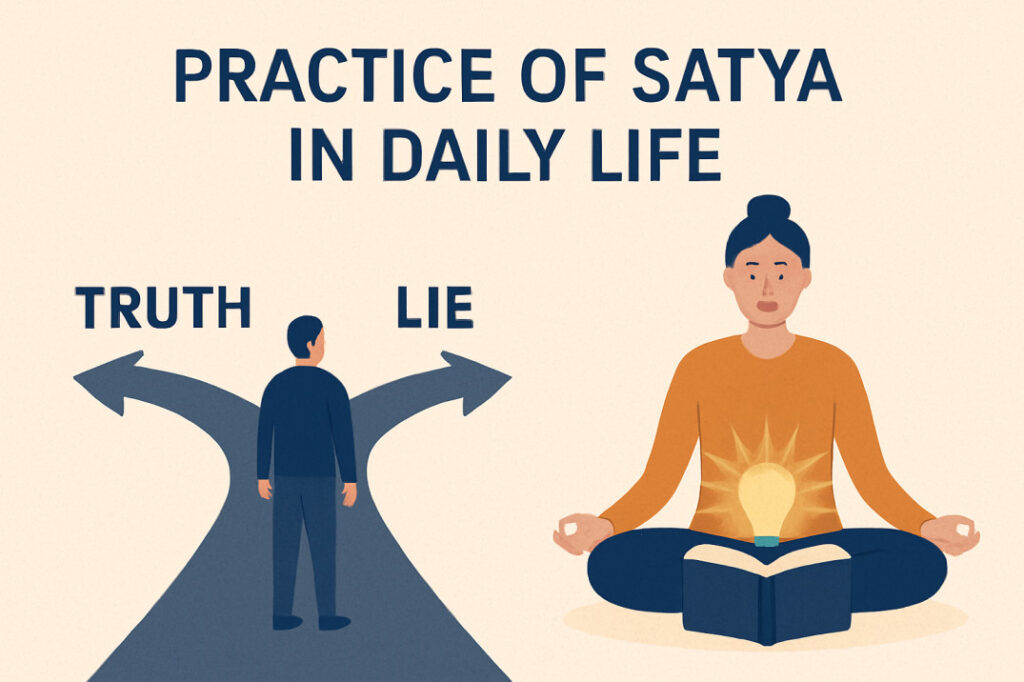- What it is?
- Ahimsa to Satya
- Different forms
- Speaking vs. seeking truth
- Truthfulness in life
- Scriptural reference
- Being not truthful
- Ways to practice
- Conclusion

If you tell the truth you don’t have to remember anything.
Mark Twain
In yoga, the practice of truthfulness is known as Satya. It is the second of the five Yamas (ethical principles) described in Patanjali’s Yoga Sutras, and it guides us to live in alignment with our real nature.
The word Satya comes from Sat, meaning “that which is true, eternal, and unchanging.” It refers to the essence of reality a purity that cannot be distorted by time or circumstance. In simple terms, Satya is truth or truthfulness, both in thought and action.
Truth exists on many levels. Sometimes it is momentary; such as feeling sad, tired, or joyful in a given situation. At other times, it is continuous, reflecting your deeper identity, health, experiences, and the values that shape your life. Living with Satya means honouring both these layers of truth and expressing them with clarity and integrity.
Journey from ahimsa to satya

In the path of yoga, Ahimsa (non-violence) naturally leads to Satya (truthfulness). That is why in the sequence of the five Yamas, Ahimsa comes first.
Ahimsa is more than the absence of violence it is kindness in thoughts, words, and actions. This same spirit forms the foundation of Satya. When truth is expressed without compassion, it can cause harm. A lie, on the other hand, not only misleads others but also pollutes the one who speaks it. A person rooted in non-violence will naturally see truth as a force that protects and nurtures rather than injures.
The Yoga Sutras of Patanjali also stress that Satya should always be practised in harmony with Ahimsa. Truth that causes unnecessary suffering is not considered true yogic practice. For example, when someone is learning a new skill, harsh or blunt honesty can discourage them. Instead, truth should be offered with care such as reminding them that mistakes are natural at the beginning and that with consistent practice, progress will come.
In this way, Satya becomes a tool for growth, not destruction. Practising it with compassion ensures that our words uplift, guide, and inspire rather than harm.
Different forms of satya
Satya can be expressed in many ways. When someone speaks with kindness, then kindness becomes the truth of their words. When a person narrates a real event, their speech carries the truth of that lived experience.
Truth also appears through action. For instance, when careless behaviour damages the environment, the destruction itself is the truth of those actions. Likewise, when our deeds match our words, our actions become true to our intentions showing integrity between speech and behaviour.
In essence, Satya is present in every form of existence physical, emotional, intellectual, or even abstract. Whether acknowledged or not, anything that truly exists carries its own truth.
Also Read: Sattva Guna: The Quality of Happiness
Even in a lie, lies a truth
At first, it may seem strange to say that a lie holds truth. But if we look deeper into the definition of truth, we see that everything that exists carries a form of truth. A lie may distort facts, yet the very act of lying reveals something real.
For example, when someone tells a lie, the false content hides the facts, but the lie itself tells the truth about the person. It may show fear, guilt, insecurity, or a lack of trust. In this way, even dishonesty reflects a deeper reality the inner state of the one who speaks it.
Speaking the truth Vs. seeking the truth

Speaking the truth is the practice of aligning our words, thoughts, and actions with honesty and righteousness. This is the form of Satya we use in daily life being truthful in conversations, actions, and behaviour.
Seeking the truth, on the other hand, is a deeper spiritual pursuit. It is less about words and more about an inner journey exploring the nature of reality and the source of existence itself. This path asks us to go beyond appearances and question what is eternal and unchanging.
Rabindranath Tagore expressed this contrast beautifully:
“The water in a vessel is sparkling; the water in the sea is dark.
The small truth has words which are clear;
The great truth has great silence.”
Truth in life, for the truth of life
To live truthfully means to live in alignment with reality. When you see things as they are without distortion from your own mind or the influence of others your understanding of life becomes clearer and more grounded.
The phrase “truth in life, for the truth of life” suggests that to realise higher philosophical and spiritual truths, we must first face our personal truths. This begins with being honest with yourself and then extending that honesty to others.
As this practice deepens, it reveals timeless realities of existence, such as:
- Material possessions and attachments hold little real value.
- Fear of loss or death has no lasting meaning.
- Endless competition and rivalry cause harm.
- Contribution carries more weight than personal success.
- All beings and the universe form a single unity.
- Political, financial, and national conflicts are insignificant in the larger scheme.
- Nature stands above all human agendas.
These are only a few of the truths that unfold when one commits to Satya. The more you nurture truth within, the more you awaken to the deeper realities of life leading to freedom, clarity, and inner strength. gets, more enlightened you will be of such realities.
Truth and Happiness
Another way to understand the phrase “truth in life, for the truth of life” is through its connection with happiness. Living truthfully is essential for genuine happiness, which can be seen as the ultimate truth of human life or at the very least, the deepest human desire.
The journey of every person is, in some form, a search for happiness. Yet lies often block the way. A single lie usually demands another to cover it, beginning a chain of deception.
This repeated cycle of lying slowly erodes inner integrity. It clouds the mind, weakens self-awareness, and distances you from your true self. Over time, this corruption of consciousness makes it harder to recognise what truly brings happiness. By contrast, living truthfully keeps your mind clear, your heart light, and your path aligned with lasting joy.
The truth you know Vs. the truth that is
The truth you know is the truth understood by the human mind, based on available knowledge and experience. The truth that is, however, refers to the universal truth unchanging and independent of human perception. Often, these two forms of truth appear differently.
For example, for centuries people believed that the Earth was flat or that the Sun revolved around the Earth. From the perspective of ultimate reality, these were untrue. Yet at that time, people accepted them as truth, not out of deceit but from the limits of human understanding.
In such cases, the truth spoken by people and the existential truth differ, yet both hold meaning in their own context. One reflects the knowledge of its time, while the other reflects the eternal reality that exists regardless of belief.
Scriptural reference of Satya

Satya, as an ethical value, lies at the heart of almost every spiritual tradition. In the Rig Veda, Satya is described as existential reality. The famous verse “Ekam Sat Vipra Bahudha Vadanti” means “Truth is one; the wise call it by many names.” Here, Sat points to the eternal essence that transcends time and form.
In the Bhagavad Gita, the word Sat is used to describe the Supreme Reality. The Upanishads also connect Sat with both existential truth and moral duty. The Taittiriya Upanishad declares: “Satyam Vada, Dharmam Chara” “Speak the truth, follow righteousness.” Another timeless teaching from the Upanishads, “Satyam eva jayate”, reminds us that “Truth alone triumphs.”
References to Satya extend beyond Hindu texts. In Sikhism, the mantra Satnam — meaning “Truth is the Name” or “the All-Pervading Supreme Reality” is one of the most revered chants. In Buddhism and Jainism, Satya is also a fundamental principle, guiding speech and conduct toward purity and non-harm.
The Upanishads also offer a powerful mantra dedicated to the journey from illusion to truth:
Asato Maa Sad-Gamaya
Tamaso Maa Jyotir-Gamaya
Mrityor-Maa Amritam Gamaya
Om Shanti! Shanti! Shantihi!
Let my journey be
From the unreal to the real
From darkness to light
From mortality to immortality
Peace, peace, peace!
Why are we not truthful?
“If you are out to describe the truth, leave elegance to the tailor.”
– Albert Einstein
The saying “truth is bitter” perhaps explains best why many people struggle to live truthfully. Truth in its raw form is often uncomfortable and difficult to accept. Yet the one who endures its initial sting eventually tastes the sweetness of freedom.
Most people, however, fear that first bitterness. In panic, they choose denial over acceptance, seeking comfort in illusion rather than facing reality. To embrace truth requires courage — the courage to face discomfort and the openness to see things as they are.
Ways to practice satya

Implementing Satya (truthfulness) is not always easy, but even the willingness to try is the first step toward living truthfully. Awareness and consistent effort help in building this value. Here are some practical ways you can start cultivating Satya in daily life:
- Face your insecurities – Most lies are rooted in fear or insecurity. Acknowledge them instead of hiding behind untruths.
- Confide in someone you trust – Share your fears and secrets with a close friend, sibling, or loved one. It helps you feel lighter and more honest.
- Reflect daily – At the end of the day, review the lies (big or small) you might have told and note them down. Awareness brings change.
- Apologise when possible – If you’ve lied to someone, confront it and say sorry. Owning up strengthens honesty.
- Play with truth – Try a “truth-only” version of truth-and-dare. It’s a fun way to build comfort with honesty.
- Connect with nature – Spending time in nature fosters love and compassion, which supports both Ahimsa (non-violence) and Satya.
- Express creatively – Pick up an art form or hobby to channel emotions. Suppressed feelings often lead to dishonesty.
- Practice meditation – It improves awareness and helps you stay aligned with what’s right.
- Stay healthy – A fit body and calm mind support ethical and clear decision-making.
- Avoid negative influences – Steer clear of distractions and company that encourage dishonesty.
- Bring Satya to your yoga mat – Accept where you are in your practice. Don’t deny your struggles, skip poses out of laziness, or rush through asanas just to “look” capable.
Being on the receiving end of Satya
When we think of truth, we usually focus on speaking it. But there’s another side we often ignorereceiving it. Many people can preach about being honest, yet when faced with a bitter truth, they retreat into denial or even resent the person who spoke it.
The reality is, most people don’t want truth they want reassurance that their beliefs are true. And when reality challenges those beliefs, they quickly reject it. But every time truth is dismissed or frowned upon, honesty loses encouragement.
That’s why, when on the receiving end of truth, we must not judge or resist it. Instead, we should welcome it with openness. Creating an environment where truth can exist is just as important as speaking it.
Conclusion
Truth is not always comfortable, yet it is the foundation of growth, freedom, and authenticity. A lie may hide facts, but it still reveals something about the one who speaks it. Likewise, while speaking the truth demands courage, receiving it requires openness and humility. To truly live by Satya is not just to speak honestly but also to create an environment where truth can exist without fear. When we embrace both sides expressing and accepting truth we align ourselves closer to reality and free ourselves from the weight of denial.




